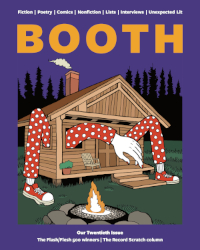by Pam Houston
For me the whole process begins with Henry James’ advice: A writer should strive to be a person on whom nothing is lost. So my first task is to pay strict attention—with all of my senses—to whatever moment I am in. What I am trying to be alert to are things that have for me a kind of shimmer of resonance around them, things that, were I with a trusted friend, I would say, “hey, look at that!” or “did you hear that?”
I call these writing-worthy objects and events “glimmers” when I teach, although I don’t love the word glimmer because it suggests prettiness, and often these things are anything but. The word glimmer does correctly suggest how momentary they can be, how sleight. The feeling of resonance—of recognition—that accompanies them is also often momentary and subtle, so at the same time I am paying strict attention to the world, I am also paying strict attention to my internal reaction to it.
A not particularly flashy example: Last night I gave a reading in Ketchum, Idaho, and at the rather spectacular dinner party afterwards, the Vodka presentation was a bottle of Kettle One frozen inside a block of ice, and inside the block of ice were frozen whole red roses. I couldn’t stop looking at it, even during dinner when I had to crane my neck around to see it. Finally, I took its picture with my phone.
I have some suspicions about why the vodka bottle drew my eye: my parents were both alcoholics; vodka was their drink of choice; my mother brought on the heart attack that killed her (too young) with a combination of high end vodka and Vioxx. There is also something in there about the bottle’s beauty—it was simply stunning—which started a mini conversation in my head about art and its relationship to the things we fear most, about the healing power of beauty.
But the truth is, it is better for me to actively resist thinking about why the ice and rose encrusted bottle captured my attention, so I am not in danger of over-determining the metaphor before it has had a chance to stew. The most important thing is to get the bottle down on paper, as completely and concisely and accurately as I can.
The next step is to combine this glimmer with five or ten or a hundred others, most of which, at first glance, would seem to have nothing to do with a vodka bottle, except inasmuch as they arrived on a similar warm wind of resonance. If all the ingredients of a story have this metaphorical integrity, I reason, all I have to do is get the right pieces next to each other, figure out which ones to include and exclude, let their meaning bubble up to the surface like Jack Daniels distills up out of good Tennessee mash (another parental favorite). All I have to do, in other words, is get far enough out of the story’s way that I don’t screw it up.



